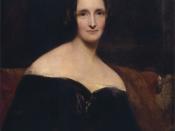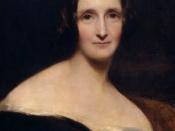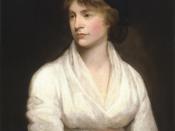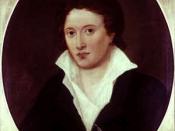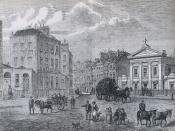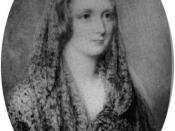Mary Shelley When Mary Wollstonecraft died in 1797, she left her newborn baby, Mary, without a mother. This baby would grow up in literary circles that greatly influenced her life. As a result of a literary lifestyle and influence, Mary Shelley endured great disappointments throughout her life.
Mary was born in Somers Town, Great Britain in 1797 to William Godwin and Mary Wollstonecraft. Wollstonecraft died, unfortunately, during childbirth. (Hamberg). Mary's father hired a nanny, Louisa Jones, to care for Mary and her half-sister Fanny Imlay. (Mellor 355). Mary was taken in and loved by Louisa and Fanny for three years until Louisa fell in love and left her. The loss was very heartbreaking to Mary considering Louisa was the only mother she had ever known.
Godwin desperately began searching for a motherly figure for his daughter. He found Mary Jane Clairmont, an unmarried mother of two. They were married before Mary's fourth birthday.
Clairmont despised Mary because of the attention she was paid. She favored her children only. Mary and Clairmont argued constantly which got so severe that Mary suffered from psychoscomatic skin boils at the age of thirteen. To ease the tension, Godwin sent her to Dundee, Scotland to stay with William Thomas Baxter in June 1812. Mary's skin boils disappeared when she and her stepmother were separated. Mary quickly adapted to her new home and became very close with the Baxter's daughters, although she missed her father terribly.
When Mary was sixteen, she moved back to London and fell in love with a man named Percy Shelley. Shelley was one of Godwin's disciples. (Hamberg). On July 28, 1814, Mary and Percy eloped to Paris taking Mrs. Godwin's daughter, Jane with them. (Ehrlich 1778). The Godwins' were very angry about the elopement and would not speak to her. They were even more disappointed when Jane decided to live with Mary and Percy. Mary, Percy, and Jane traveled across Europe and kept a journal. They published these letters in 1817. They were called History of a Six Weeks' Tour Through a Part of France, Switzerland, Germany, and Holland: With Letters Descriptive of a Sail Round the Lake of Geneva, and of the Glaciers of Chamouni. (Mellor 355).
During their trip, Mary became pregnant and when they returned to England, Mary gave birth to Clara, who only lived two weeks. After Clara's death on March 6, 1815, Mary asked Jane to leave. While Jane was gone, she fell in love with a poet, Lord Byron. He had no affection for her. Percy wanted to meet Byron so the two of them plus Mary and Jane spent a summer in Switzerland for about three months. During that summer, on June 15, 1816, they decided to write what is now one of the most powerful horror stories of modern times. They called it Frankenstein. (Ehrlich 1778).
Frankenstein is based on valid scientific research; it gives a persuasive prediction of what science might accomplish later in life, and it offers a humanistic critique of the pros and cons of the nature of scientific thought. (Mellor 360). Shortly after Mary completed Frankenstein, her second daughter, Clara Everina, died from lack of medical attention. Then, on June 7, 1819, Mary's only surviving child, William died of malaria. This is when her period of depression began. To escape this depression she began writing Mathilda. During this time she gave birth to her second son, Percy Florence on November 12, 1819. Mathilda is a powerful tale which relates to many aspects of Mary's life. (363).
The last years of married life were filled with disaster for Mary. The only reason she was getting by was the birth of her only surviving child, Percy. (Academic 229). Mary and Percy moved to Italy where Percy suddenly drowns during a sailing trip on July 8, 1822. This was devastating to Mary and left her a twenty-five year old widow with a two year old son to raise. She wrote a letter describing her feelings on June 29, 1819: "We came to Italy thinking to do Shelley's health good- but the Climate is not any means warm enough to be of benefit him and yet it is that that has destroyed my two children." (Letters, vol. 1, p.101). Mary wanted to keep the memory of Percy alive so she published several editions of his writings. Mary spent her last years with her son and two good friends. She died in 1851 at the age of fifty-three of nervous attacks that had produced a partial paralysis. (Hamberg).
Mary Shelley's lifelong search for a good family was never successful. Her literary lifestyle greatly influenced her life. She died a very strong woman, considering the disappointments she faced in her life.
795
